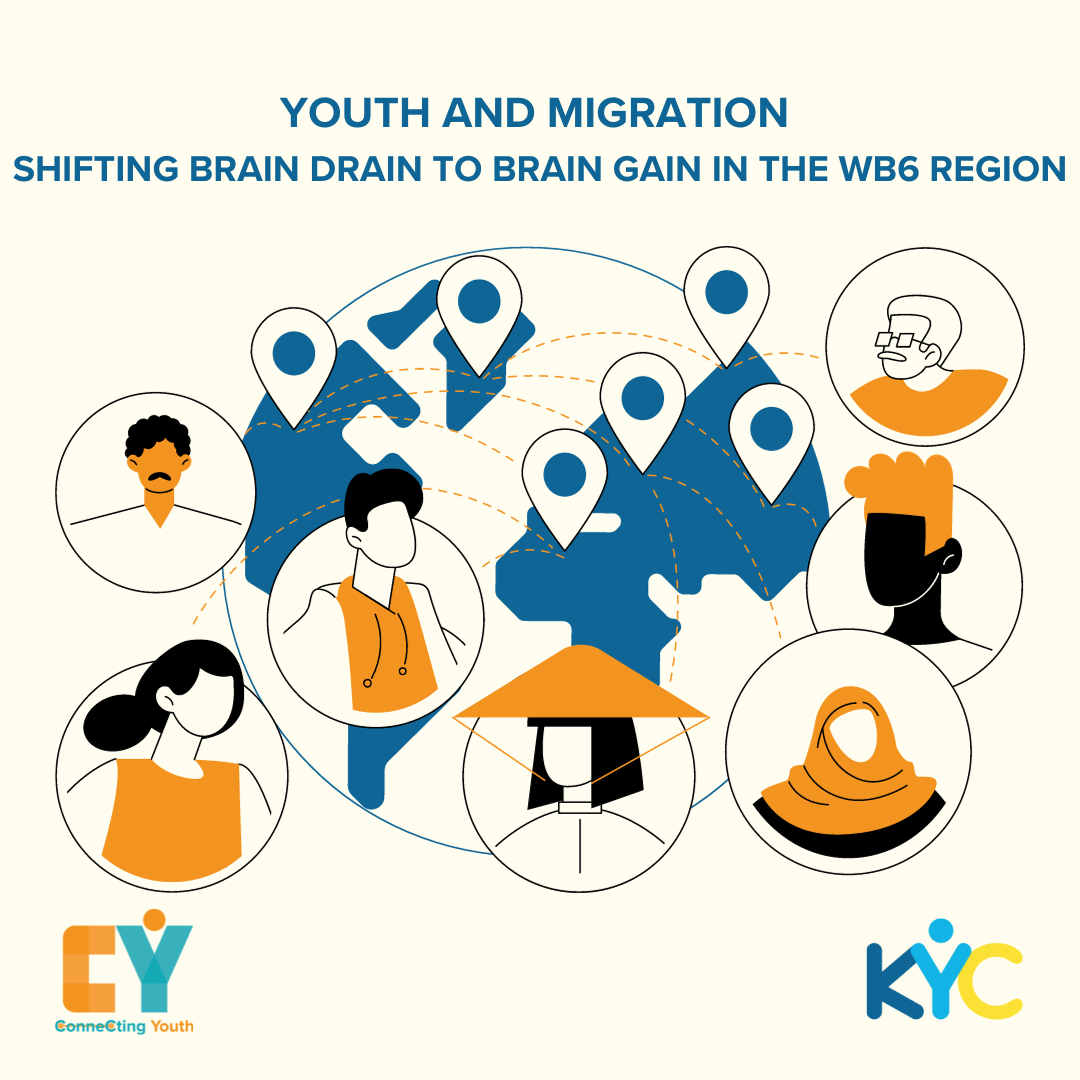05.09.2023

As a young resident of one of the Western Balkans Six (WB6) countries, I am acutely aware of the challenges posed by youth migration and brain drain in our region. Many talented individuals from the WB6 countries, driven by limited opportunities and the allure of better prospects elsewhere, leave their home countries in search of a brighter future. However, amid these challenges, there lies a tremendous opportunity to shift the paradigm from brain drain to brain gain. In this blog, I will delve into the reasons behind youth migration, explore the potential benefits of reversing the youth turnover, and discuss strategies to foster brain gain in the WB6 region.
Brain drain refers to the exodus of highly skilled and educated individuals from their home countries to seek opportunities abroad. In the context of the WB6 region, this phenomenon has been fueled by factors such as economic stagnation, political instability, limited job prospects, and insufficient support for entrepreneurship and innovation. Many talented young individuals feel compelled to seek greener pastures elsewhere, leaving a void of expertise and potential within their home countries.
While the mass departure of educated people, poses significant challenges, it is essential to recognize the immense potential of brain gain – the return of skilled individuals and their contributions to their home countries. The repatriation of talented youth can inject fresh energy, ideas, and skills into the WB6 countries. By tapping into the knowledge and experiences gained abroad, we can leverage this potential to drive economic growth, foster innovation, and enhance various sectors such as technology, healthcare, education, and entrepreneurship.
To facilitate brain gain, the WB6 countries must focus on creating supportive environments that attract and retain talented individuals. This entails addressing the underlying causes of brain drain and implementing measures to provide better opportunities for personal and professional growth. Investing in education and vocational training, enhancing research and development capabilities, and promoting innovation ecosystems are essential steps toward creating an enabling environment. By nurturing talent and providing mentorship, funding, and networking opportunities, we can incentivize the repatriation of skilled individuals and create an ecosystem that welcomes them back.
Establishing platforms for diaspora engagement and leveraging their expertise can create a powerful network that bridges the gap between the countries of origin and diaspora communities. By facilitating knowledge transfer, collaboration, and investment, we can harness the skills and experiences of the diaspora to fuel development and growth within the WB6 region. Initiatives such as mentorship programs, entrepreneurship support, and joint research projects can facilitate diaspora engagement and tap into their vast potential.
Building knowledge-based economies requires a strong focus on research and development (R&D). The WB6 countries can foster brain gain by investing in R&D infrastructure, promoting collaboration between academia and industry, and providing financial support for innovative projects. By creating an environment that values research, encourages intellectual curiosity, and supports scientific breakthroughs, we can attract young researchers, innovators, and professionals, both from within the region and abroad. Collaborations with international institutions and participation in EU research programs can further bolster R&D capacities and stimulate their return.
Entrepreneurship and innovation are powerful drivers of economic growth and job creation. By fostering an entrepreneurial ecosystem that supports startups, provides access to capital, and offers mentorship and networking opportunities, the WB6 countries can attract talented individuals who seek to build their ventures. Developing incubators, accelerators, and coworking spaces, along with simplified administrative procedures for starting and operating businesses, can create an attractive environment for repatriating talent.
Shifting the narrative from brain drain to brain gain requires changing perceptions and promoting a positive image of the WB6 countries. Highlighting success stories of individuals who have returned and made significant contributions can inspire others to consider repatriation. Celebrating local talent, showcasing opportunities for growth and impact, and fostering a culture of innovation and entrepreneurship can create a sense of optimism and attract skilled individuals back to their home countries.
By recognizing the potential of repatriated talent, creating enabling environments, engaging the diaspora, investing in research and development, promoting entrepreneurship and innovation, and changing the narrative, we can foster brain gain in our region. It is through collective efforts, collaboration, and supportive policies that we can create an ecosystem that attracts and retains talented individuals, driving economic growth, innovation, and prosperity in the WB6 countries.

Hi, my name is Blina Salihi I was born and raised in the capital of Kosovo, Pristina. Recently, I finished my studies in Science of Law at the University of Pristina. I was able to recognize the field of pre-university education and the field of human rights in Kosovo mainly through the Kosovar Youth Council where I had the role of a project coordinator and from my current experience as an intern in the Office of the Prime Minister of Kosovo. For several years, I have been an activist of changes in Kosovo’s society, mainly in the field of education, human rights and youth participation.